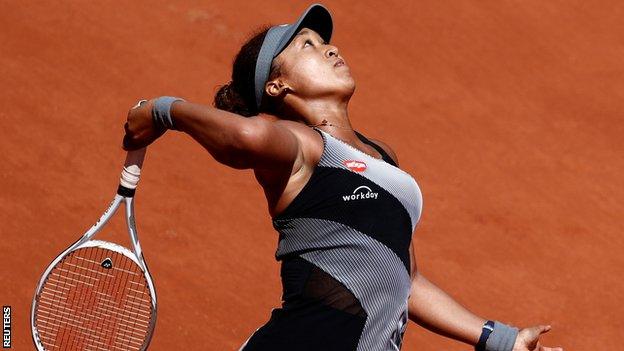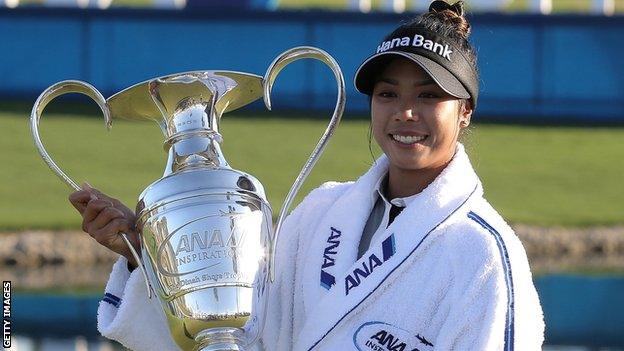US Women's Open: Naomi Osaka's French Open withdrawal should prompt pause for thought
- Published

Osaka announced her withdrawal from the French Open after releasing a statement saying she would not face the media during the tournament
As the world's best female golfers gather for the US Women's Open in San Francisco, the withdrawal of Naomi Osaka from the French Open tennis should prompt pause for thought.
Like tennis, golf is an individual sport where, especially on the women's side, there is constant pressure to make the most of public attention.
Osaka's stance, which surely transcends beyond tennis, comes in the same week as golf's biggest and most prestigious female tournament.
Unlike in the racquet and ball sport, there are no mandatory news conferences in professional golf. After bad rounds, players will skip media commitments, rarely causing much of a stir.
But, as in tennis, there is an expectation on players to promote themselves, their sponsors and the tournaments they play. The pressure on women is even greater because their events are invariably played in the shadow of more lucrative men's tournaments.
This week's US Open offers prize money of $5.5m (£3.9m), with the winner taking $1m (£700,000). On the PGA Tour in Ohio, the men are playing for $9.3m (£6.5m) with the winner gaining around $1.7m (£1.2m) at The Memorial but no major title is at stake.
When next month's men's US Open is played at Torrey Pines it will generate around $165m (£116m) for the United States Golf Association, while this week's female version will lose around $9m (£6.3m).
Hence, the theory goes, inferior prize funds for female golfers. Osaka and co play for equal spoils at the four tennis Grand Slams, but there is a similar scrap for attention.
Professional female golfers are condemned to play for inferior funds purely because of their gender. They can do nothing about it, other than to further their celebrity by embracing media opportunities when they come along.
Invariably those arrive as a result of on-course excellence, which can suddenly thrust them into the spotlight.
In the past year this has happened to two engaging, interesting and exciting talents who emerged as surprise major winners: Sophia Popov, at the AIG Women's Open last August and Thailand's Patty Tavatanakit in April's ANA Inspiration.
"Obviously I feel like I've got to manage my time a little better now, coming to press conferences and stuff," Tavatanakit said as she embarked on her first spell of tournaments as a major champion.
"It's just a little bit more tiring, I would say, like preparing for tournaments and stuff. You kind of have to work your way around that a little bit and manage your time a little better."

Rookie Tavatanakit won her first major title in April at the ANA Inspiration in California
The 21-year-old from Thailand has a ready smile and a big-hitting golf game that could make her a superstar. She was the centre of attention when she returned to Asia for two recent tournaments.
Prior to her ANA success, when she brilliantly held off a charging Lydia Ko in some of the most exciting golf action of the year, Tavatanakit lived in the relative obscurity of life outside the world's top 100.
Since winning that maiden major, she posted shares of third places in Singapore and Thailand before making the quarter-finals of last week's LPGA Match Play at Shadow Creek. She is playing well.
But off course, Tavatanakit admits the reaction to her new status created a steep learning curve. "It was overwhelming to the point where I didn't know that it was overwhelming," she said at only her second tournament as a major champion in Singapore in April.
"Looking back, yeah, I was like really overwhelmed by the attention I got because I'm not really used to having to give so much energy to a lot of people, but I feel like going through that, I'm learning a little bit more.
"I tend to say 'yes' to someone who matters or like some more important stuff, which I told my agent and my manager that I don't have enough energy to give to everyone."
Few players know better than Popov the life changing impact of major success. When the 28-year-old German so emotionally won at Royal Troon, she was ranked 304 in the world.
Now she is the 16th-ranked player and one of the most quotable golfers in the game. Her story of battling back from the debilitating effects of Lyme disease, external to become a major champion is as compelling as they come.
Popov has become an inspiration to those fighting for a living on feeder tours, like she was prior to her stunning Troon triumph.
"I think that's the greatest thing that a lot of the players have learned from my week, is that it can change at any moment," she said.
"I think that was very important for a lot of them to see because I think that will help them not give up."
Popov arrives at the US Women's Open in fine form, having reached the final of the Match Play before losing out to champion Ally Ewing. Both, along with Tavatanakit, will be among those to watch at Olympic Club this week.
Naturally, the USGA is doing all it can to promote its event, including pairing the Korda sisters - Nelly and Jessica - for the first two rounds. The daughters of former tennis star Petr are ranked fourth and 11th in the world respectively.
They come from a family used to dealing with the spotlight and are expected to embrace the inevitable attention this week. But Osaka proves that top sports people are not all made the same.
Britain's last major golf winner, Georgia Hall, who won the 2018 Women's Open at Royal Lytham, tweeted her support for the Japanese tennis star.
"I have full respect for @naomiosaka voicing her struggles," said the 25-year-old from Dorset. "What she has done for the game is incredible and such a fantastic role model.
"Mental health is far more important than an interview here or there and hopefully issues like this will be better resolved in the future."
Those comments pertain to tennis, but they are just as telling for golf and especially during this week - the biggest week on the women's calendar.
